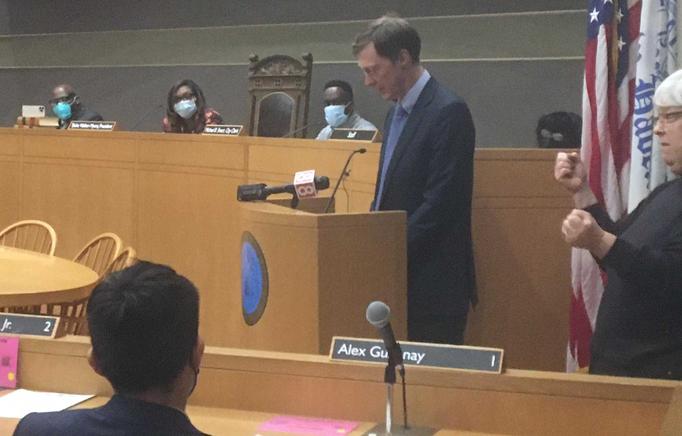City Manager: Winchester can handle spike in residential development Subscribe Today
WINCHESTER — Right now, there are 1,662 housing units proposed for construction in Winchester within the next three to four years.
Meanwhile, the revised Comprehensive Plan adopted last week by City Council states Winchester only needs to add 123 new housing units every year to meet the city's population projections of 31,107 by 2030 and 33,031 by 2040. If every one of the nearly 1,700 proposed houses and apartments are built, that would equate to enough new housing to meet growth projections for nearly 14 years.
Despite the sudden surge in housing projects, City Manager Dan Hoffman said Winchester should have no trouble accommodating thousands more residents because the number of newly constructed dwellings in the city has been lagging for three decades.
For example, Hoffman said on Wednesday, "From 2010 to 2020, we only brought 456 housing units online. ... We have 30 years of undergrowth."
Winchester's inability to attract builders willing to construct enough dwellings for its growing population — the city currently has an estimated 28,078 residents — has created a significant housing shortage that has driven up rental and mortgage prices and made low-cost dwellings almost impossible to find.
On Wednesday, the online rental service Zumper reported only six apartments and two houses were available for rent within the city's 22601 ZIP code. Prices ranged from $1,100 per month for a one-bedroom/one-bathroom apartment on South Loudoun Street to $1,795 per month for a two-bedroom/two-bathroom apartment on Valor Drive.
The online real estate service Zillow listed 12 single-family homes available for purchase Wednesday within Winchester's city limits. Prices ranged from $215,000 for a four-bedroom/two-bathroom duplex on East Monmouth Street to $1,985,000 for a six-bedroom/six-bathroom manor house on West Piccadilly Street.
Real estate developers have noticed the dire need for housing in Winchester and brought forth numerous development proposals, but the price of almost every new unit is based on current market rates that are too expensive for many local working-class individuals and families. According to Realtor.com, the current average selling price of a single-family home in Winchester is $321,000. Zumper reports the current average rent for a one-bedroom apartment in the city is $1,050.
As more housing becomes available in the next few years, Hoffman said rental and mortgage prices should hold steady or perhaps even drop.

Also, Winchester developer John Willingham is working on a project to convert the long-vacant ZeroPak apple-processing and storage facility on North Cameron Street into an affordable housing complex with up to 190 units, which would add significantly to the local housing supply and could have the broader effect of lowering rental prices for comparable dwellings elsewhere in the city.
As for the 1,662 houses and apartments currently proposed for construction in Winchester (that figure does not include the ZeroPak project because no permits have yet been requested from Rouss City Hall), Hoffman said it's unlikely they'll all be built.
"Many times these things fall through because of financing or whatever, but I think it's safe to say we'll get north of a thousand," he said.
A thousand dwellings with an average occupancy of 2.5 people each would equate to 2,500 new residents on top of the 28,078 people who already live here. A population increase of that scope over the next three or four years would have a noticeable impact on school enrollment and traffic flows, but Hoffman said Winchester can handle it.
If city officials determine a development will cause significant traffic problems, Hoffman said developers can be required to pay for road improvements such as turn lanes and median strips. Every major residential development in Winchester is required to submit a traffic impact analysis to Rouss City Hall as part of the approval process.
As for Winchester Public Schools, "We've seen declining enrollment for quite some time now, to the point where the superintendent [Jason Van Heukelum] has been very vocal about needing more students," Hoffman said. "We have capacity in our schools right now. We actually need to do a little catch-up based on our growth patterns for the last 30 years."
If Winchester gets to the point where it has too much housing, City Council has limited authority to slow residential growth. Current regulations state that development can still occur if it complies with a property's zoning ordinances for size, placement, density and usage. Council cannot turn down any by-right residential proposal unless the developer requests a property rezoning, planned unit development (PUD) overlay or a conditional-use permit.
An example of this occurred late last year with a 28-acre parcel of land near the Museum of the Shenandoah Valley, where a private developer requested a PUD in order to cluster together 74 age-restricted houses on a portion of the property. Council denied the PUD, but the developer could still go in by right and build up to 79 single-family homes assuming adequate open space is maintained around each dwelling.
Other municipalities place temporary moratoriums on residential development once certain thresholds are reached. For example, Hoffman said, Montgomery County, Maryland, has a regulation that automatically restricts development if county schools reach 110% of capacity.
There are no such safeguards in Winchester, but Hoffman said it's unlikely the city would ever become so inundated with housing that its infrastructure, emergency and educational services couldn't keep pace. That's because an excessive number of dwellings would saturate the market to the point where developers would stop submitting requests to build subdivisions and apartment complexes because they would no longer be profitable.
"I can tell a developer until I'm blue in the face that Winchester is a great city and we would love to have them invest in it," Hoffman said, "but if there is no demand, they won't take the risk of building."







